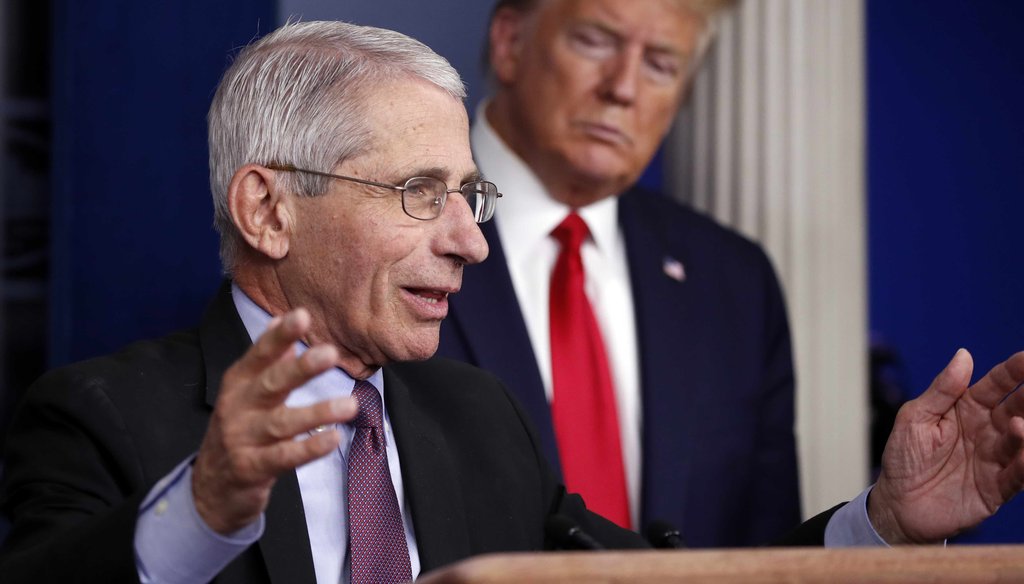Get PolitiFact in your inbox.

In this April 22, 2020 file photo President Donald Trump watches as Dr. Anthony Fauci, director of the National Institute of Allergy and Infectious Diseases, speaks about the coronavirus at the White House in Washington. (AP)
If Your Time is short
-
During the first month or so after the virus appeared and U.S. cases were still low, Fauci said the country as a whole faced a low risk. But he regularly added that the situation could change.
-
Before the Jan. 31 travel limitations on China, Fauci told reporters a ban was not a good idea. He later said it bought the country time, but by itself couldn’t protect the United States.
-
On masks, Fauci said early on that they offered little protection to the person wearing one, and avoiding crowds and frequent hand washing was more effective.
Dr. Anthony Fauci might enjoy the trust of most Americans, but in the White House, not so much.
President Donald Trump voiced his wariness of Fauci, the head of infectious disease at the National Institutes of Health. Trump told Gray TV host Greta van Susteren that he didn’t agree with Fauci.
"Dr. Fauci said don't wear masks and now he says wear them," Trump said July 7. "He said numerous things. Don't close off China. Don't ban China. I did it anyway."
Trump told Fox News host Sean Hannity July 9, "Fauci is a nice man, but he's made a lot of mistakes."
On July 11, the Washington Post reported that White House staff released a statement saying that "several White House officials are concerned about the number of times Dr. Fauci has been wrong on things."
The Post said the statement included a long list of Fauci’s alleged errors. Among them, doubt that people without symptoms could play a significant role in spreading the virus, and a late February comment that "at this moment, there is no need to change anything that you’re doing on a day-by-day basis."
Some of the criticisms of Fauci focus on statements that came when little was known about the disease. Others overlook the caveats he included with his reassuring words.
Fauci’s comments also came in the context of Trump, who offered a drumbeat of encouragement. In mid February, Trump said "we’re in very good shape," and near the end of the month that "the coronavirus is very much under control."
RELATED: Timeline: How Donald Trump responded to the coronavirus pandemic
PolitiFact has fact-checked several misleading claims about what Fauci has said. Here is a summary of Fauci in his own words on the travel ban, wearing masks, the size of the threat, and the risk of asymptomatic transmission.
Banning most travelers from China
A few days after Jan. 21 — when the first confirmed case of the virus in the United States was reported — Fauci and other top health officials gave a closed-door briefing to a group of senators. After the Jan. 24 briefing, Fauci told a reporter with S&P Global that restricting travel was "not a good idea at this time." Fauci said it "would create a lot of disruption, economically and otherwise, and it wouldn't necessarily have a positive effect."
The Hill reported that as Fauci left the briefing, he said "it’s not something that I think we're even considering."
Fauci was generally supportive of the Chinese travel restrictions Trump announced on Jan. 31, but he cautioned that its impact would be limited.
A month later, Fauci was interviewed on Fox Business.
"We've done really quite well thus far, and I think one of the reasons why is that what we did early on was that travel restriction from China, preventing a lot of people who are infected, particularly from Wuhan, from coming into the country," he said Feb. 28 on "Lou Dobbs Tonight." "We have a challenge ahead of us because as this virus spreads globally, it becomes even more challenging for us to prevent cases from coming here."
That was similar to what he told Dobbs previously on Feb. 13.
"If in fact, this virus starts to seed itself in a sustained way in other countries, we will be dealing with a global pandemic," Fauci told Dobbs. "And if we have a global pandemic, Lou, as difficult as this is to accept, we will have a big problem in this country."
Wearing masks
It wasn’t until April 3 that the Centers for Disease Control and Prevention recommended that people cover their faces in public. Early on, Fauci said mask use by the general public would have little value in preventing someone from contracting the disease. Some of his comments came at a time when the country faced a severe shortage of the N-95 masks that can protect against the virus.
Fauci said this on Jan. 31 on NBC’s "Today Show": "Those kinds of masks that you just get in a store don't keep the virus out. Probably the one thing they do the most is they prevent you from touching your nose and your face, which is even more important than trying to keep out virus with a mask that actually lets virus through."
CNN, Feb. 2, 2020: "The masks are not perfect. They're not going to prevent all the viruses, the particles to get through. They may prevent some of the — when you sneeze and you cough and you have those particles that come out...It may be better than no mask, but it's not 100% protection, that's for sure."
On Feb. 19, USA Today reported that Fauci said to the newspaper’s editorial board, "'Should I start wearing a mask?' Now, in the United States, there is absolutely no reason whatsoever to wear a mask."
In a March 27 interview, Fauci said given the shortage of masks, the general public ranked last behind doctors and nurses, and people who are infected.
"When we say you don't need to wear a mask, what we're really saying is make sure you prioritize it first for the people who need the mask," Fauci said. "In a perfect world, if you had all the masks you wanted, then you could get some degree of protection, but make sure you prioritize it well."
How big a risk or threat does the coronavirus pose
In the early months, Fauci followed the practice of telling reporters how the situation stood at the moment — which, given relatively few cases, was generally encouraging — but warning that the situation could change.
On Jan. 20, Fauci told CNN, "It really is an evolving situation, and we have to be prepared for the worst. I mean, I don't think there is cause for panic on anyone's part but we certainly need to be following it and watching this very carefully."
The next day, the first country had its first confirmed case. On Fox Business’ "Lou Dobbs Tonight", Fauci said "I believe it can still be stopped, Lou, and it's completely impossible to predict what the scope is going to be, what the kinetic is going to be. … this is something that will likely spread more before we actually get it under control."
With just 15 cases reported as of Feb. 22, Fauci told CNN, "At this particular moment, Michael, the risk is very low. But, and I have to underline ‘but’, this could change and it could change rapidly. Getting back to what you said about a pandemic, if this evolves into a pandemic there's no way we in the United States are going to escape having more infections in this country."
On Feb. 29, with cases still numbering just 24, Fauci spoke in the morning on NBC’s "Today Show" and later that day at the White House Coronavirus Task Force briefing. On NBC, he said:
"Right now at this moment there's no need to change anything that you’re doing on a day by day basis. Right now the risk is still low, but this could change. I’ve said that many times even on this program. You’ve got to watch out because although the risk is low now, you don't need to change anything you’re doing. When you start to see community spread, this could change and force you to become much more attentive to doing things that would protect you from spread."
And at the White House briefing:
"The country as a whole — because we get asked that all the time — still remains at low risk. But when we say that, we want to underscore that this is an evolving situation."
Asymptomatic transmission
There’s a difference between someone who has the virus and is about to show symptoms and someone who gets it and never has any noticeable sign. The second type is purely asymptomatic and there was a lot of uncertainty on this point at a Jan. 28 White House briefing. The CDC said there were reports of it, but they hadn’t seen the data.
Fauci put the question into the context of past coronaviruses.
"We would really like to see the data because, if there is asymptomatic transmission, it impacts certain policies that you do regarding screening, etc. But the one thing historically people need to realize is that, even if there is some asymptomatic transmission, in all the history of respiratory-born viruses of any type, asymptomatic transmission has never been the driver of outbreaks. The driver of outbreaks is always a symptomatic person. Even if there's a rare asymptomatic person that might transmit, an epidemic is not driven by asymptomatic carriers."
On Jan. 21, Fauci was uncertain during a Fox Business interview about the extent to which a person infected but not yet showing symptoms could spread the disease. "We know with general viruses like this, it is often that you can actually shed virus and spread it for a day or so before you actually feel sick," he told Dobbs. "Whether that's the case here with this coronavirus, we haven't determined that yet completely."
On June 10, with 2 million confirmed cases in the U.S., Fauci told ABC News in no uncertain terms that a large fraction of people infected remain asymptomatic and "we know from epidemiological studies that they can transmit to someone who is uninfected even when they are without symptoms."
Our Sources
The Hill, Top health officials brief senators on coronavirus as infections spread, Jan. 24, 2020
S&P Global, Senators suggest coronavirus travel ban, emergency; GOP briefs timeline denied, Jan. 24, 2020
CNN, CNN Newsroom, Jan. 20, 2020 (via Nexis)
Fox Business, Lou Dobbs Tonight, Jan. 21, 2020 (via Nexis)
Fox Business, Lou Dobbs Tonight, Feb. 13, 2020 (via Nexis)
Health and Human Services Department, HHS Secretary, CDC provide update on coronavirus threat in U.S., Jan. 28, 2020
NBC, Today Show, Jan. 31, 2020 (via Nexis)
CNN, CNN Newsroom, Feb. 2, 2020 (via Nexis)
CNN, Newsroom, Feb. 7, 2020 (via Nexis)
USA Today, Official: Danger of contracting coronavirus in US is 'minuscule', Feb. 19, 2020
NBC Bay Area, Read the Full COVID-19 Q&A With Stephen Curry and Dr. Fauci, March 27, 2020
Washington Post, Fauci is sidelined by the White House as he steps up blunt talk on pandemic, July 11, 2020
Factba.se, Donald Trump interview with Sean Hannity, July 9, 2020
Factba.se, Donald Trump interview with Greta van Susteren, July 7, 2020
White House, Press Briefing by Members of the President’s Coronavirus Task Force, Jan. 31, 2020
NPR, Does The New Coronavirus Spread Silently?, Feb. 5, 2020
CNN, CNN Newsroom, Feb, 10, 2020 (via Nexis)
Fox Business, Lou Dobbs Tonight, Feb. 11, 2020 (via Nexis)
CBS News, Face the Nation, Feb. 16, 2020
CNN, Newsroom, Feb, 18, 2020 (via Nexis)
Fox Business, Lou Dobbs Tonight, Feb. 19, 2020 (via Nexis)
CNN, Smerconish, Feb. 22, 2020 (via Nexis)
Fox Business, Lou Dobbs Tonight, Feb, 24, 2020 (via Nexis)
CNN, Cuomo Prime Time, Feb. 25, 2020 (via Nexis)
Fox Business, Lou Dobbs Tonight, Feb. 28, 2020 (via Nexis)
NBC, Today Show, Feb. 29, 2020
White House, Remarks by President Trump, Vice President Pence, and Members of the Coronavirus Task Force in Press Conference, Feb. 29, 2020
CNN, Global town hall: Coronavirus, March 19, 2020
New York Times, On Coronavirus, Americans Still Trust the Experts, June 27, 2020
NPR, CDC Now Recommends Americans Consider Wearing Cloth Face Coverings In Public, April 3, 2020
PolitiFact Virginia, Did Fauci tell U.S. 'not to worry about' coronavirus?, April 29, 2020
PolitiFact, Are COVID-19 travel restrictions ‘more critical in saving lives’ than testing? Not really, April 3, 2020
PolitiFact, Tweet amplified by Trump misleads on Fauci’s late-February advice, April 13, 2020
Centers for Disease Control and Prevention, Previous U.S. COVID-19 Case Data, May 20, 2020
ABC, Good Morning America, June 10, 2020




















































